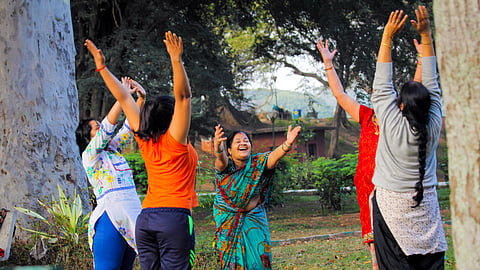
- Mental health mattersMental health matters
- Mental IllnessMental Illness
- Life stagesLife stages
- Caregiving
- Workplace Mental Health
- Legal Matters
- Subscribe

Self-esteem is defined as a person’s attitude towards oneself which can be positive or negative. How we think about ourselves doesn't just stop at how we see ourselves in an overall manner—for example as a "good person" or a "bad person"—but also links to specific aspects of our personality like how we view our bodies or whether or not we think we are beautiful, which is known as "body image." Infact, self-esteem is so intrinsically linked to thoughts about one's body that physical appearance has consistently been found to be a significant predictor of self-esteem at many ages.
Research has found women to have lower esteem than men when it comes to viewing their bodies, because while men are socialized to achieve their self-esteem through achievement, power status and control, women are socialized to believe that appearance is an important basis of self-evaluation and evaluation by others. This close association between self-esteem and body image becomes even more problematic in societies like ours where the media—television, movies, advertising and music videos—not only emphasize that female worth should be based on appearance, but also present a powerful but false cultural ideal of female beauty that is becoming increasingly unattainable. A survey conducted on young Indian women revealed that 60-75% of adolescent girls feel negatively about their body shape and size, and "the way I look" is the most important aspect of self worth for 44% of them. Lowered self-esteem due to body image issues manifests itself in various psychological forms such as anxiety and depressive tendencies. Research has also found that people who are extremely dissatisfied with their bodies have a higher tendency to take extreme measures such as dieting and excessive exercising which may be unhealthy and harmful. They are also more prone to developing eating disorders such as anorexia, bulimia or compulsive eating syndrome.
Despite all these worrying consequences surrounding body dissatisfaction, the good news is that while changing one's actual appearance is difficult and complicated, changing one's body image is possible. We have the power to change the way we see, feel and think about our bodies. Some tips to start with could be:
Focusing on your positive qualities, skills and talents can help you learn to accept and appreciate your whole self. A person is much more than just a physical being.
Making it a point to say positive things to yourself everyday and avoiding self-talk that is berating or negative is important. When you say something often enough you start to believe it. Try using positive self affirmation, such as “I did a good job at work today,” or “I am proud of myself for walking up the flight of stairs instead of taking the elevator,” and try and identify negative thoughts and replace them with something positive.
For example, instead of saying “I hate how I eat junk all the time,” you could replace the phrase by a more positive one like “I know I can make more healthy eating choices.”
Consciously focusing on what your body can do and has done: The body is amazing; appreciating and respecting all the things it can do will help you feel more positively about it which could include acknowledging the ability of your body to exercise/play a sport or thinking about how a woman’s body aids the beautiful childbirth process.
Setting positive, health-related, focused goals rather than weight-loss-related ones: Engaging in practices with food and exercise that promote health over weight loss/management will be more positive for your overall wellbeing than just wanting to lose weight to look a ‘certain way’.
Avoiding making body comparisons to others by reminding oneself constantly that everyone is unique and differences are what make a person special. Research has shown that it is important to accept oneself as a whole in order to be more confident of oneself and have positive self-esteem.
Making a conscious decision about what to read and look at, since we sometimes draw our worth out of messages that media gives out to us of what is ‘beautiful’ or ‘acceptable.’ Here it is important to remember that the majority of images presented in the media are unrealistic and represent a minority of the population. Many of the images in magazines have been digitally altered and do not represent what real people look like.
If you or your loved one feels very dissatisfied with your body or if you feel like you are developing unhealthy eating or exercise habits, professional help is a good idea. There are counselors and psychologists who have specialized knowledge in the areas of body image. Professional support can help guide you to change negative beliefs and behaviors.
Dr Garima Srivastava is a Delhi-based clinical psychologist with a PhD from the All India Institute of Medical Sciences.
We are a not-for-profit organization that relies on donations to deliver knowledge solutions in mental health. We urge you to donate to White Swan Foundation. Your donation, however small, will enable us to further enhance the richness of our portal and serve many more people. Please click here to support us.
